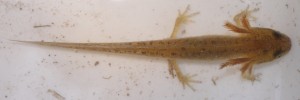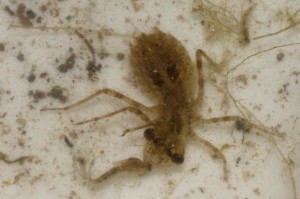Nine Friends of Crossness Nature Reserve joined reserve manager Karen Sutton last night (27th June) for a second after-dark pond-dipping session at the site, this time on the Southern Marsh.
DRAGON EATS DAMSEL
Time flew by and we only properly examined the new waterbody on Saline Field, taking advantage of the extensive boardwalk. We were particularly impressed by the large numbers of Damselfly nymphs and Dragonfly larvae, the latter of which may have been Broad-bodied Chasers, which species has been seen around this large pond, and is known to favour pools with less well-developed vegetation.
The voracious nature of these aquatic predators was brought home to us when one of the Dragonfly larvae promptly captured and started eating a Damselfly larva in the observation tray.
LONE NEWT MAKES LAST MINUTE APPEARANCE
Having billed this summer’s two after-dark pond-dipping sessions at Crossness as a chance to find Newts on the site, and having been the only person to see one on the first occasion, Karen was especially pleased to spot a single young Newt just as we were about to call it quits. At first she thought it might be another fish, but closer observation revealed otherwise. It was caught with a bit of deft network, despite having disappeared from view into some algae, and was admired by attendees before being returned whence it came.

This probable Smooth Newt larva, with its four legs already well grown, will soon absorb its gills and metamorphose into an air-breathing, land living animal. (Photo Martin Petchey).
It was almost certainly a Smooth Newt, and not a Palmate, given the known distribution of these species in the Borough and was pleasing evidence that the pond is already being used as a breeding site by these amphibians.
Also of interest was the occurrence of a Charophyte (Stonewort), which hadn’t been noticed on previous daytime visits. This ancient lineage of plants is uncommon in London, soon getting out-competed by higher plants, especially once waters become too nutrient-enriched. The Marsh-sow Thistles planted around this pond and a couple of ancillary ditches some weeks ago, were also seen to be doing well.
For more Crossness events, see the Calendar page.

